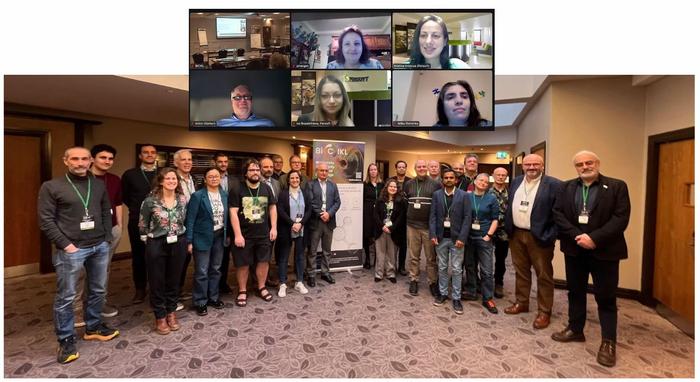The city of Cambridge and the Wellcome Campus hosted the Final General Assembly of the EU-funded project BiCIKL (acronym for Biodiversity Community Integrated Knowledge Library): a 36-month endeavour that saw 14 member institutions and 15 research infrastructures representing diverse actors from the biodiversity data realm come together to improve bi-directional links between different platforms, standards, formats and scientific fields. Consortium members who could not attend the meeting in Cambridge joined the meeting remotely.

Credit: BiCIKL
The city of Cambridge and the Wellcome Campus hosted the Final General Assembly of the EU-funded project BiCIKL (acronym for Biodiversity Community Integrated Knowledge Library): a 36-month endeavour that saw 14 member institutions and 15 research infrastructures representing diverse actors from the biodiversity data realm come together to improve bi-directional links between different platforms, standards, formats and scientific fields. Consortium members who could not attend the meeting in Cambridge joined the meeting remotely.
The 3-day meeting was organised by local hosts European Molecular Biology Laboratory (EMBL) and ELIXIR in collaboration with Pensoft Publishers.
After a welcome cocktail reception on Monday evening at Hilton Cambridge City Centre, on Tuesday, the consortium made an early start with a recap of BiCIKL’s key milestones and outputs from the last three years. All Work Package leaders had their own timeslot to discuss the results of their collaborations.
They all agreed that the Biodiversity Knowledge Hub – the one-stop portal for understanding the complex – yet increasingly interconnected landscape of biodiversity research infrastructures – is likely the flagship outcome of BiCIKL.
In the afternoon, the participants focused on the services developed under BiCIKL. Amongst the many services resulting from the project some were not originally planned. Rather those were the ‘natural’ products of the dialogue and collaboration that flourished within the consortium throughout the project. “A symptom of passion,” said Prof. Lyubomir Penev, project coordinator of BiCIKL and founder/CEO of Pensoft Publishers.
An excellent example of one such service is what the partners call the “Biodiversity PMC”, which brings together biodiversity literature from thousands of scholarly journals and over 500,000 taxonomic treatments, in addition to the biomedical content available from NIH’s PubMed Central, into the SIB Literature Services (SIBiLS) database. What’s more, users at SIBiLS – be it human or AI – can now use advanced text- and data-mining tools, including AI-powered factoid question-answering capacities, to query all this full-text indexed content and seek out, for example, species traits and biotic interactions. Read more about the “Biodiversity PMC” in its recent official announcement.
Far from being the only one, the “Biodiversity PMC” is in good company: from the blockchain-based technology of LifeBlock to the curation of the DNA sequences by PlutoF, the BiCIKL project consortium takes pride in having developed twelve services dedicated to FAIR and linked ready-to-use biodiversity data.
All those services are already listed in the FAIR Data Place within the Biodiversity Knowledge Hub, where each is presented with its own video. For many services, from the same page, visitors can also download factsheets meant to serve as user guidelines. All will also be featured in the EOSC catalogue.
All services developed under BiCIKL with links to their explanatory videos:
- SynoSpecies by Plazi
- The Biodiversity Literature Deposit by Zenodo: https://youtu.be/3grDK2Rh3Ps
- The Treatment Bank by PlaziSiBiLS SPARQL Endpoint by SiBiLS
- LifeBlock by LifeWatch ERICBiodiversity PMC by SiBiLSNanopublications for Biodiversity by Knowledge Pixels and PensoftOpenBiodiv by PensoftCuration of DNA sequences by PlutoFBiotXplorer, the biotic browser
- ARPHA Writing Tool 2.0 by Pensoft
On Wednesday, the consortium focused on BiCIKL’s activities from the Transnational and Virtual Access Pillar, which included both presentations by each open call leader and VA leader, as well as open discussions and a recap of what the teams have learnt from these experiences.
Thursday was dedicated to an open event where BiCIKL partners and ELIXIR Biodiversity and Plant Communities came together to discuss the Future of Biodiversity and Genomics data integration at the EMBL Wellcome Genome Campus. You can find the agenda on BiCIKL’s website.
After 36 months of action, the BiCIKL project will officially end in April 2024, but does it mean that all will be done and dusted come May 2024? Certainly not, point out the partners.
To ensure that the Biodiversity Knowledge Hub will not only continue to exist but will not cease to grow in both use and participation, the one-stop portal will remain under the maintenance of LifeWatch ERIC.
In conclusion, we could say that an appropriate payoff for the project is “Stick together!” as put by BiCIKL’s Joint Research Activity Leader Dr. Quentin Groom.
***
You can find highlights from the BiCIKL General Assembly meeting on X via the #BiCIKL_H2020 hashtag (in association with #Cambridge and #finalGA)
***
All BiCIKL project partners:
- Pensoft Publishers, Bulgaria
- Naturalis Biodiversity Center, Netherlands
- Plazi, Switzerland
- Meise Botanic Garden, Belgium
- European Molecular Biology Laboratory and Elixir/EMBL-EBI, Germany
- European Organization for Nuclear Research, Switzerland
- Consortium of European Taxonomic Facilities (Belgium) and Muséum national d’Histoire naturelle (MNHN, France, associated party to CETAF)
- Institut Suisse de bioinformatique (SIB), Switzerland
- Tartu Ülikool (UTartu), Estonia
- E-Science European Infrastructure for Biodiversity and Ecosystem Research (LifeWatch), Spain
- Freie Universitaet Berlin (FUB-BGBM), Germany
- Global Biodiversity Information Facility (GBIF), Denmark
- SPECIES 2000 (sp2000) and The Catalogue of Life (COL), United Kingdom
- Taxonomic Databases Working Group, today’s Biodiversity Information Standards (TDWG), Netherlands




